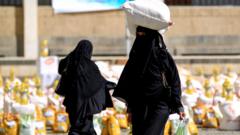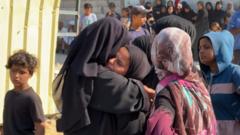In Yemen, the arrest of numerous aid workers by Houthi authorities has created an atmosphere of fear among humanitarian organizations. As half the population, including millions of children, requires assistance, the crackdown jeopardizes crucial aid efforts amidst an ongoing civil war.
Yemen’s Humanitarian Workers Face Crackdown Amid Ongoing Crisis

Yemen’s Humanitarian Workers Face Crackdown Amid Ongoing Crisis
Aid workers in Yemen express fear and trauma as recent Houthi raids result in arrests, further exacerbating the country’s humanitarian crisis.
In a shocking turn of events, humanitarian workers in Yemen find themselves grappling with fear and uncertainty as recent raids by Houthi forces lead to multiple arrests. Hanaa, a staff member at a US-funded NGO, reflects on the chaos she witnessed at her workplace, where armed personnel confiscated vital resources and detained her superior, leaving an indelible mark on the community dedicated to supporting women and addressing dire social issues.
For the past decade, Yemen has been embroiled in a brutal civil war, contributing to one of the most severe humanitarian disasters in the world. According to UNICEF, approximately half of Yemen's population, including nearly 10 million children, urgently need humanitarian assistance. The situation has darkened further with widespread fear as Houthi rebels have detained 24 UN employees and workers from local NGOs in recent months, including the tragic death of a World Food Programme employee in custody.
The near-constant threat of retribution looms large for humanitarian staff, leading many organizations to reconsider their operations. As Hanaa expressed concern over the impact of US political decisions on her organization's safety, she highlighted the misinformation circulating within the local populace, which has begun to view aid workers with suspicion. This retaliatory environment is causing many dedicated individuals to abandon their posts in hopes of ensuring their own safety.
Interviewing those affected reveals the profound suffering and helplessness pervasive within the displaced community. Amal, a mother of nine, exemplifies the struggle faced by families in dire need of aid: “Cutting aid would be a death sentence to us,” she declared, as she relied solely on monthly food provisions that barely sustain her family amid deteriorating living conditions.
The grim reality extends to medical facilities as well, where hospitals face critical shortages of resources and treatments needed to combat rampant malnutrition and disease among the displaced population. A survey conducted in December found that 64% of households in Yemen could not secure sufficient food, deepening the urgency for international support and operational freedom for NGOs.
As international observers call for the immediate release of detained aid workers, the emotional toll felt by those fighting to provide critical services becomes more apparent. Hanaa, along with her colleagues, strives to continue improving the lives of children and families amid adversity, lamenting that without aid and support, illiteracy rates and suffering may only increase.
The plight of Yemen’s humanitarian workers stands as a testament to the heartbreak caused not only by mortality but by the erosion of community trust and support in dire times, exposing the fragility of humanitarian goals in war-torn areas.
For the past decade, Yemen has been embroiled in a brutal civil war, contributing to one of the most severe humanitarian disasters in the world. According to UNICEF, approximately half of Yemen's population, including nearly 10 million children, urgently need humanitarian assistance. The situation has darkened further with widespread fear as Houthi rebels have detained 24 UN employees and workers from local NGOs in recent months, including the tragic death of a World Food Programme employee in custody.
The near-constant threat of retribution looms large for humanitarian staff, leading many organizations to reconsider their operations. As Hanaa expressed concern over the impact of US political decisions on her organization's safety, she highlighted the misinformation circulating within the local populace, which has begun to view aid workers with suspicion. This retaliatory environment is causing many dedicated individuals to abandon their posts in hopes of ensuring their own safety.
Interviewing those affected reveals the profound suffering and helplessness pervasive within the displaced community. Amal, a mother of nine, exemplifies the struggle faced by families in dire need of aid: “Cutting aid would be a death sentence to us,” she declared, as she relied solely on monthly food provisions that barely sustain her family amid deteriorating living conditions.
The grim reality extends to medical facilities as well, where hospitals face critical shortages of resources and treatments needed to combat rampant malnutrition and disease among the displaced population. A survey conducted in December found that 64% of households in Yemen could not secure sufficient food, deepening the urgency for international support and operational freedom for NGOs.
As international observers call for the immediate release of detained aid workers, the emotional toll felt by those fighting to provide critical services becomes more apparent. Hanaa, along with her colleagues, strives to continue improving the lives of children and families amid adversity, lamenting that without aid and support, illiteracy rates and suffering may only increase.
The plight of Yemen’s humanitarian workers stands as a testament to the heartbreak caused not only by mortality but by the erosion of community trust and support in dire times, exposing the fragility of humanitarian goals in war-torn areas.



















